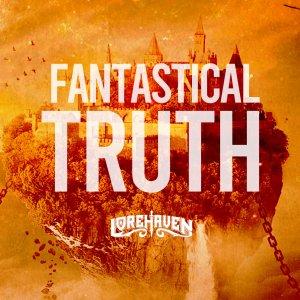Fantastical Truth

169. Should Christian Stories Feel Free to Show Cussin’ and Fightin’?
Most people think “Christian fiction” avoids “unclean” content like sex, violence, and bad language.[1. Photo by Clément M. on Unsplash.] But in fact, many of these stories have often pushed these limits. We know of a few books now that are experimenting. Just in time for Independence Day in the United States, we will ask—should these stories make very free to show their characters cussin’ and fightin’?
Subscribe to Lorehaven
middle grade • teens + YA • adults • onscreen • author resources • gifts • guild
Episode sponsors
- Enclave Publishing: Estuary by Lisa T. Bergren
- The Pop Culture Parent
- Lorehaven Summer Reading Challenge
Concession stand
- This episode serves as sequel to episode 120 (a rare Stephen solo show).
- We’re going to focus on cussin’ and fightin’, and this time no sexy stuff.
- We have plenty of other episodes (and will have more) about sexy stuff.
- Although we’ll touch on the TV shows, here we focus on written fiction.
- Also, we’ll make secondary applications to parenting, yet focus on selves.
- Too many of these discussions skip over individuals and focus on kids.
- Yet all of us implicitly agree that kids don’t see what adults can see.
- We just may pretend that this issue is only about the kids or vulnerable.
- Also we may refer to roundtable discussions from early Lorehaven print:
- Roundtable: Engaging Fictional Violence in Our Real Worlds
- Roundtable: Engaging That @&*% Our Stories Often Say
1. What does the Bible say about Christian freedom?
- Let’s follow the apostle Paul’s truth in Galatians, such as Galatians 5:13:
For you were called to freedom, brothers. Only do not use your freedom as an opportunity for the flesh, but through love serve one another.
- Stephen’s actually about to start a Galatians study at church. Please pray.
- Here the apostle Paul has spent many chapters lambasting legalism.
- Many listeners have grown up with “do not handle” rules (Col. 2:20-23).
- So they may be tempted to overcorrect and say that all things are lawful.
“All things are lawful,” but not all things are helpful. “All things are lawful,” but not all things build up.
1 Corinthians 10:23
- But the apostle Paul doesn’t want to fix only one issue. He wants Jesus.
- The whole point of any good rule, or freedom, is Jesus and human love.
- That’s the point of this text, and we’ll carry that into these two topics.
2. How may the Bible treat issues of story violence?
- We describe this as, “Violent acts in a visual or written work of fiction.”
- How may we hear some Christian fans (or writers) defend story violence?
- When and how is story violence different from committing real violence?
- At what points do we believe the violence is “too much” or tempting?
- For what reasons does the Bible include violent descriptions?
- Must the Scripture form our explicit example for how our stories do this?
3. Does the Scripture warn us against story cussin’?
- This topic may actually call for even more caution and definitions.
“Fiction that includes, either in character dialogue or narrative itself, any of these elements: offensive words, crude names, vulgarities, or slang that misuses God’s name(s) or misuses biblical concepts/places.”
- How may we hear some Christian fans (or writers) defend story cussin’?
- When and how is story cussin’ different from committing real cussin’?
- At what points do we believe the cussin’ is “too much” or tempting?
- For what reasons does the Bible include possible uses of bad words?
- Must the Scripture form our explicit example for how our stories do this?
Mission update
- New book quest for Cathy McCrumb’s sci-fi Recorder
- New review (Friday, July 7) of Chuck Black’s sci-fi Nova
Next on Fantastical Truth
We’re move into summer and toward the Realm Makers conference. ‘Tis time for us to plan hot topics, blockbuster guests, and many surprises.






 Visit Podcast Website
Visit Podcast Website RSS Podcast Feed
RSS Podcast Feed Subscribe
Subscribe
 Add to MyCast
Add to MyCast